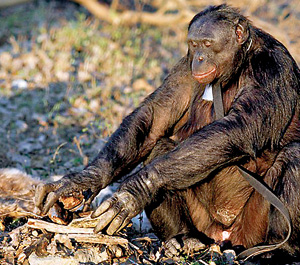Eagerly he collects wood from the ground, snaps the branches into small pieces and carefully balances them in a pile. Then, taking care not to burn himself, he gently strikes a match and gets ready for a fry-up.
Like all red-blooded males, Kanzi loves messing around with a barbecue. But then, as these extraordinary pictures show, Kanzi is no man. He is a bonobo - pygmy chimpanzee - and his love of fire is challenging the way that we think about our closest relatives in the animal kingdom.
For although bonobo apes and larger chimpanzees use twigs and leaves as tools, none has ever shown such skill for cooking food.
Kanzi is one of eight bonobos in the care of Dr Sue Savage-Rumbaugh, one of the world's leading experts in ape behaviour and language. She believes 31-year-old Kanzi's fascination with fire reveals a deep intelligence.
 |
| Intelligent cooking: The pygmy chimpanzee searches for the perfect site for a camp fire then carefully piles sticks onto a bed of dry leaves |
Dr Savage-Rumbaugh, of the Great Ape Trust, in Des Moines, Iowa, adds: 'Kanzi makes fire because he wants to. He used to watch the film Quest For Fire when he was very young which was about early man struggling to control fire. He watched it spellbound over and over hundreds of times.'
He was also fascinated by the camp fires his keepers made to cook food. And he was encouraged to interact with humans and copy them. At the age of five, he was making small piles of bone dry sticks.
He was taught to use matches, a skill he picked up quickly. There's something eerie about watching Kanzi strike a match. The way he then holds the flame - taking care not to burn himself - is remarkably human.
'Fire is one of the most important factors in our evolution,' says Dr Savage-Rumbaugh.
'When humans learned to control fire and to domesticate dogs we began to feel a new level of safety which freed us to become creative and to create more sophisticated cultures.'
'Fire enabled us to cook meat, which helped break it down and meant we could eat more of it. Plants we cooked on fires were made more digestible. In short, cooking led us to eating better, which meant we developed large brains.
'We sat around in communal groups cooking, stoking and simply watching the fire - a situation in which language and conversation started to develop.'
Kanzi - the name means Treasure in Swahili - does not stay close to make sure his fire stays lit. But he does throw on more wood from a distance. And he has learned how to cook. He will take a marshmallow, stick it on the end of a twig and hold it carefully over the flames, ensuring it doesn't burn.
He can place a grill pan on the fire and cook hamburgers. When he has finished with the fire, Dr Savage-Rumbaugh asks him to put it out using a bottle of water. He will carefully pour the liquid over the flames until it has been extinguished.
Kanzi is now incredibly passing on his skills to other apes. His son Teco, who lives in the same research centre, watches Kanzi as he solves problems. The researchers believe he may learn to make fires, too.
Kanzi, who weighs 12st, is the brightest of the apes at the Great Ape Trust. With two other apes at the centre, he uses paper keyboards to communicate with Dr Savage-Rumbaugh and fellow primatologist Liz Pugh.
In conversation with the researchers he points to symbols, known as lexigrams, on the keyboards representing different words.
He has learnt to 'say' around 500 words through the keyboard, and understands 3,000 spoken words.
Bonobos are one of the most endangered species and there are around 10,000 to 50,000 left in the wild, all in Africa's Democratic Republic of Congo. They share 98 to 99 per cent of their DNA with us.
For Kanzi's own safety, he is only allowed to make fires under close supervision. But his behaviour raises fascinating questions.
What would happen if he was released into the wild where other bonobos could copy his behaviour? And could wild bonobos learn how to master fire independently just like our own ancestors?
You don't have to be a fan of the Planet Of The Apes movies - in which intelligent apes threaten mankind's supremacy on the Earth - to find those questions disturbing.
Or maybe, like King Louie in Disney's The Jungle Book, he just wants to ape us.
© Daily Mail, London
|


